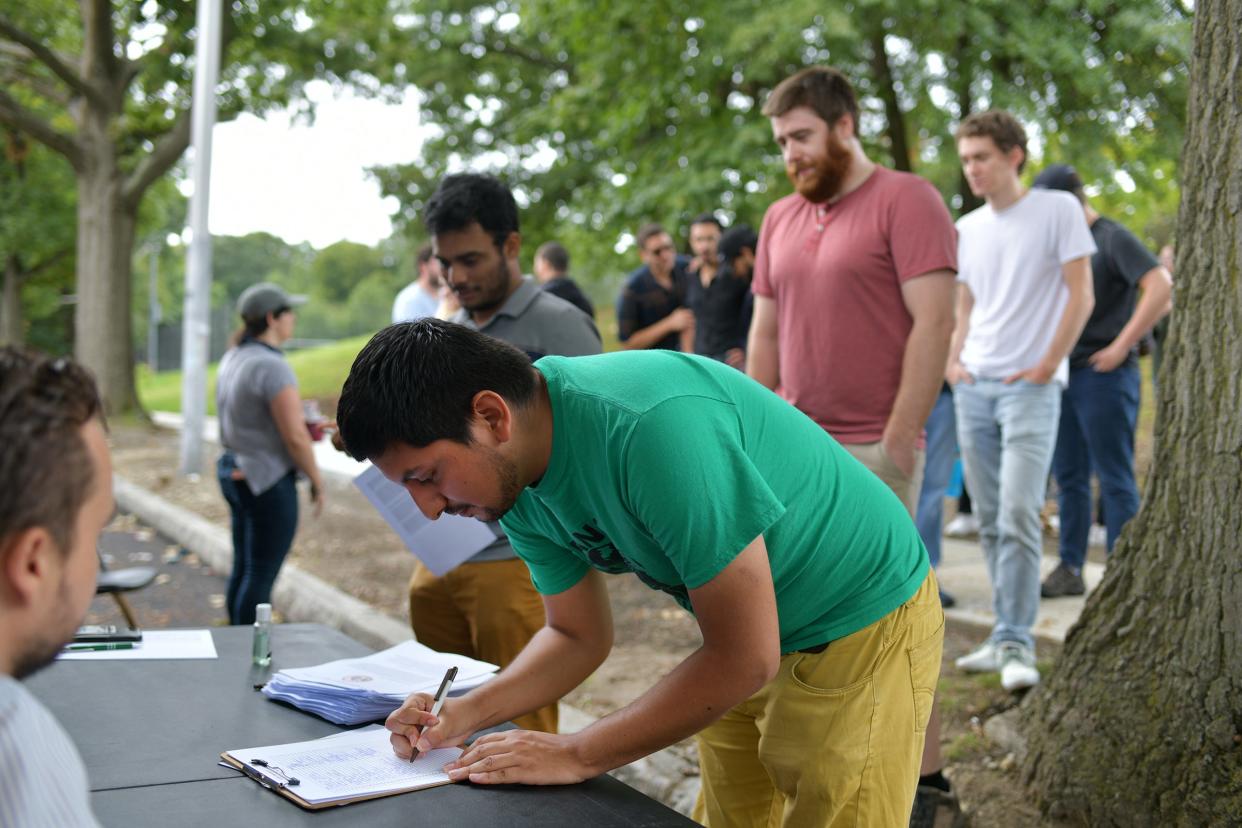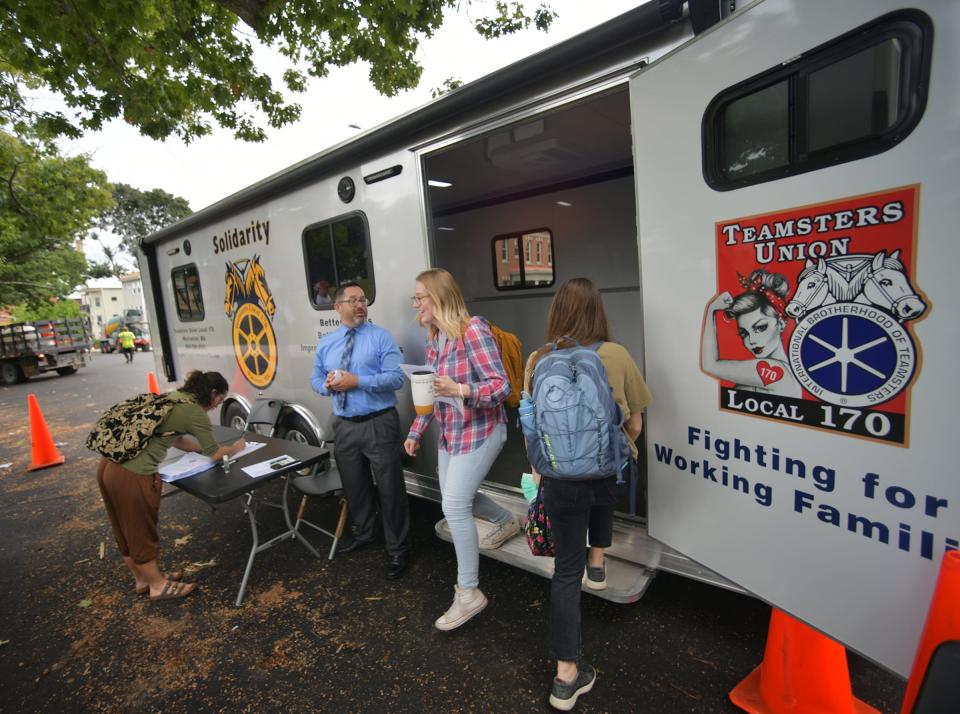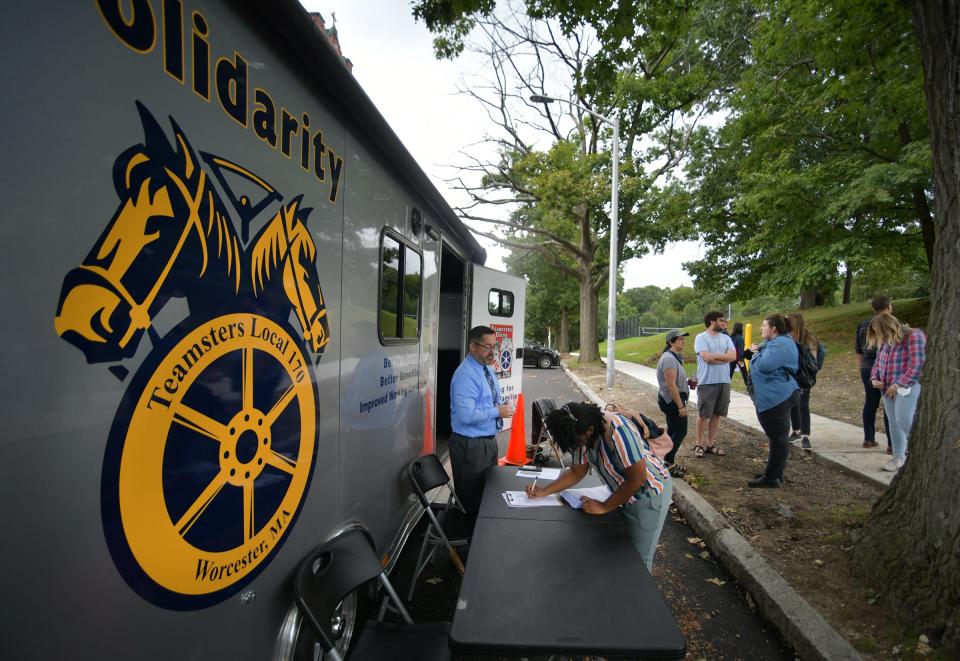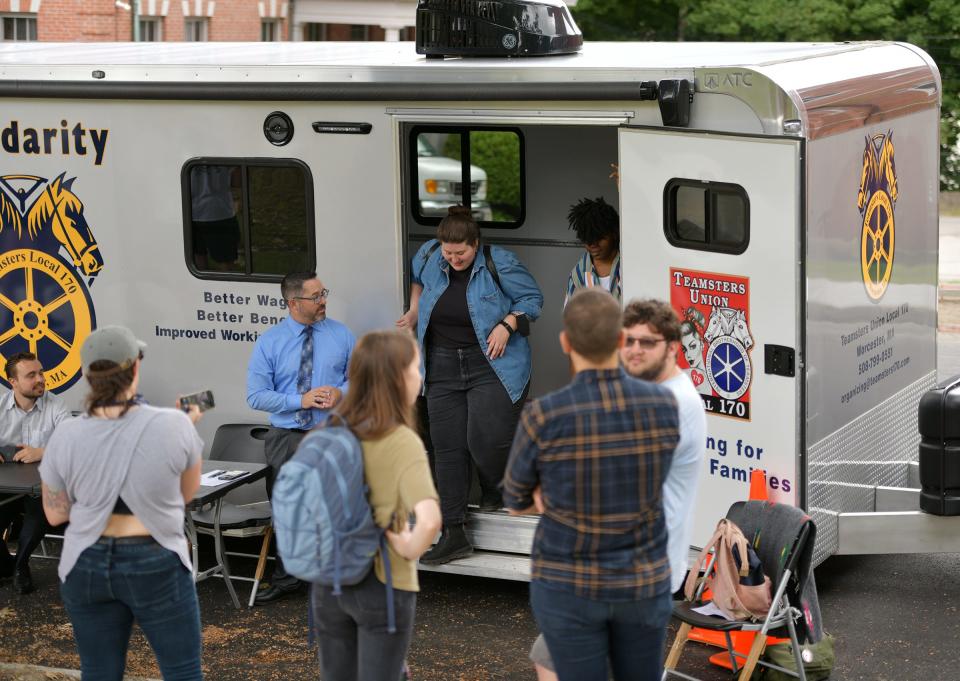Clark graduate student union members overwhelmingly vote to authorize strike

WORCESTER — Forming a line down Illinois Street in front of University Park, nearly 100 members of Clark University Graduate Workers United took turns Monday afternoon stepping in and out of a gray Teamsters Local 170 trailer to vote on whether to authorize a strike.
On Tuesday afternoon, Gia Davis, a fifth-year doctorate student and union organizer, said the union members had voted 97% in favor of authorizing the strike.
Clark University Graduate Workers United has been in negotiations with the university over a contract and is seeking increased stipends and full health care coverage.
"Once we have the authorization votes, we can go on strike at any point and it'll be a matter of coming to Clark and being like, 'Hey, we're ready to do this and we're able to do this. ... Are you going to come to the table in a more meaningful way?' I hope so," said Davis, who uses they/them/their pronouns.
Although the union would have the authority to go on strike, voting in favor of authorizing it does not mean they would immediately go on strike, Davis said. But, they added, the graduate students are "also very much prepared to do what we need to do to get a contract."

On Monday afternoon, Clark University released a statement through spokeswoman Angela Bazydlo.
"The University continues to work in good faith to complete the collective bargaining process and finalize a contract, and we are well ahead of the usual timeline for negotiations of this kind. We will not comment publicly about the ongoing deliberations," the statement said.
Negotiating since April
The union, which formed in March after members voted overwhelmingly in favor of unionizing, started contract negotiations with the university in April.
The group rallied on campus in August, accusing the university of not approaching negotiations with good faith.
The sides have had six bargaining sessions, the most recent taking place at the end of August. At that meeting, Davis said, the university presented an economic proposal for stipends and health care.

But the group did not feel it adequate. Davis felt "personally offended" by the offer.
By the first week of September, the union announced the strike authorization vote based on "Clark's refusal to offer a serious economic offer for graduate workers and the urgent need of our membership.
"We’re looking to increase the floor for our stipends … meaningful raises that’ll keep up with inflation, the cost of living,” Davis said.
They also said the group would also like to see full health insurance coverage including vision and dental, and for union members who are parents to be able to add dependents.
"We only get funding for four years guaranteed in most programs, so we only get funding to be a TA (teaching assistant) or an RA (research assistant)," Davis said. "We would love to see an extension for that due to COVID because much of our work has been delayed due to the pandemic."
Throughout Monday afternoon, student workers traveled through the park to cast their votes. Standing off to the side of the Teamsters Local 170 trailer were supporters from the Independent Socialist Group and SMART-TD Local 1473, a railroad union.
M.K. Speth, a doctorate student in the genocide studies program, said she felt "really proud" to be able to vote, especially as a first-year student.
'Hoping it goes well'
Speth said that while she voted to authorize the strike, she hopes it doesn't come to that because she and other students don't want to have to pause the work they're doing.
"I'm hoping it goes well," Speth said. "I think that would be wonderful to cover actually full health care and obviously just a living wage."

International fourth-year physics doctorate student Ghilles Ainouche said the union and the vote meant a lot to him.
"Maybe it's even more important than domestic students because we can be wronged very easily," he said. "if you are, for example, a domestic student, you can go work outside as you wish. But if you're an international, if you've got low wages, and cannot survive, you cannot go outside, you are tied to the school."
He had tried getting a position in New Jersey teaching physics and had done well in the interview, but his department would not sign off.
"I didn't get the signature. Instead they wanted me to work five times a week," Ainouche said. "That's a lot of work compared to other students that are only getting one lab a week."
For Tee Freeman, a third and a half year social psychology doctorate student at Clark, an increased stipend would mean no longer having to go into "survival mode."
"This culture of being a grad student, even at Clark University, has put us all into survival mode," Freeman said. "As educators, I don't believe any educators should just be forced to just survive, especially when we have such an important job.
"Every two weeks, we're literally looking at our paychecks and being like, 'What am I gonna pay? What am I not gonna pay?' "
Freeman said she currently lives with four other roommates in a house, surviving off a stipend of $22,000 per year.
"I think that we should be given the wages that we deserve for the work that we put in," she said.
This article originally appeared on Telegram & Gazette: Nearly 100 Clark University graduate students in union cast votes for possible strike in Worcester
